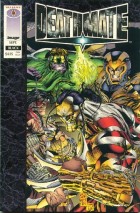
November 7, 2007
 The Best & Worst Things I Read Today
The Best & Worst Things I Read Today

Strangely, they're both connected to the Writers' Strike.
* the best thing I've read today is
a post from SLG's Jennifer de Guzman at Evan Dorkin's site, where she says they've already received an e-mail from an agent declaring their writers ready to work on comics, and that they also received a submission where "the writer listed all of the unproduced screenplays he'd written (which of course he was submitting in graphic novel form)." It's funny because it's sad. I like the idea that making comics is a set of skills that any writer with time on their hands can provide as easily as wanting to, let alone there being a notion that the marketplace is somehow starved for more clumsy, high-concept genre comics.
* the worst thing I've read today
is this piece by Tom McLean at Variety. McLean starts out with some sturdy link-blogging to plans for writers with a foot in each world to do some comics work, and the sensible suggestion that if the strike goes on that some ridiculously delayed projects might actually be concluded.
It then goes into a long history lesson linking the strike to the formation of Image. I guess this is a connection that could be made on some level, but McLean provides a history of Image that bites on every piece of self-promotion that company ever put forward, formally and informally, like it was a golden apple from the Vine of Truth.
The piece is riddled with odd logic and oversights. Marvel is castigated by a set-up where we found out they thought that they could survive the loss of the Image creators the same way they survived the loss of Jack Kirby. Well, they did, and spectacularly. And
of course the final lesson from Image has yet to be drawn -- Image is still around. Jim Lee selling WildStorm to DC seems to be put in the victory for the general thrust of Image and therefore creator's rights category, which I think could be debated from a variety of standpoints. Rob Liefeld wasn't fired from anything; the whole deal is dependent on him not being an employee.

My main objection would be historical fudging or willfully looking the other way. Let's take a big one. McLean says, "Of course, that kind of runaway growth couldn't be sustained, and the crash was so hard that its repercussions are still being felt." It's the "of course" part that grates. Making the slow late '90s/ early '00s sales wheeze part of a natural cycle absolves all of the abuse that Image heaped on a market that had never seen a publisher that popular
and that erratic, abuses which were charted in excellent fashion by a young Eric Reynolds, and can be testified to by store owners that were wounded, some critically, by the cash flow problems caused by late arriving books and books of dubious quality. It also ignores stuff like the shortsighted, key decision that Image made to give the market over to a Diamond whose primary policies were going to be shaped by the deals they made with a few power companies; thanks, Image. Other areas where I'd have issues in a historical sense is that many of the creators who McLean casts in the light of making a move for creators rights turned right around and were doing work for hire themselves before too long, from both directions; I don't really remember Marvel and DC hiring a bunch of Image imitators any more than it's usual for popular creators to have imitators (DC in fact was pretty conservative art-wise through the mid-'90s); and the Image founders benefited from being made names by companies who saw value in creating names; they can be hostile places to creators in the end, and may value the company over the creator, but not because they see absolutely no value in the creator. I think they've long seen that as a commodity as well.
None of this means I hate Image. I like Image, generally, I like the Image deal, particularly as it exists now in comparison to some out there, and I agree with McLean it can be used as a model against which the claims of companies who trumpet they
must have all cross-media rights should be examined -- Image wants none of them. Image's founding was a pretty amazing business story with some creator's rights elements, but as a Creator's Rights story, it sort of tanks. Hard. When McLean laments the state of the current Direct Market dependent on work-for-hire properties, that should be the first clue that no such revolution was ever really fought.
posted 1:06 am PST |
Permalink
Daily Blog Archives
November 2019
October 2019
September 2019
August 2019
July 2019
Full Archives


